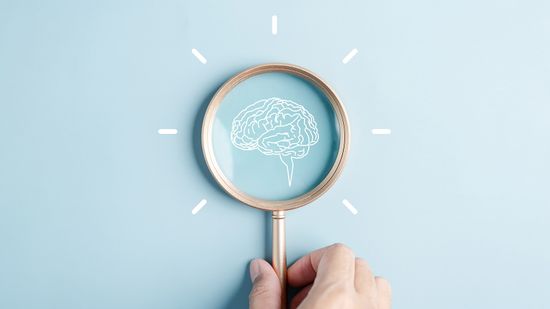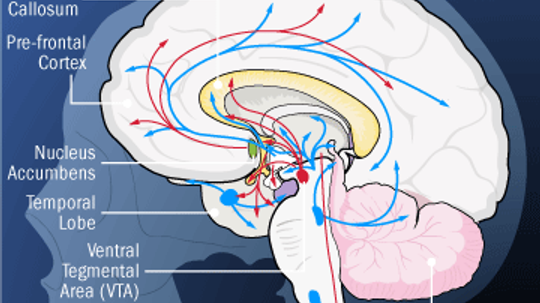Inside the Mind
What are dreams really made of? Are humans the smartest animal? What causes schizophrenia? Travel inside the mind and find out how the human brain works.

Is He Faithful? How to Identify Signs of Cheating in a Relationship

Why the Little Albert Experiment Could Never Happen Today

Milgram Shock Experiment: A Vital Lesson in Social Psychology

9 Types of Intelligence: The Many Ways to Expand Your Mind

Phineas Gage and the Birth of Modern Neuroscience

Call of the Void: A Counterintuitive Form of Self-preservation
Learn More / Page 7
You're deep in dreamland when you hear an explosion so loud you wake up. But there's nothing outside or inside your house making the noise. What just happened?
By Sean Russell
Odd as it may seem, many antidepressants like Zoloft having warning labels about increases in suicidal thoughts. Why would that be? And how will you know if your medication is actually working?
When you see someone yawning, even in a picture, chances are a yawning urge will come over you, too. But is this also true of sneezing, and if so, why?
Advertisement
Most of us don't intuitively classify electroshocks as therapeutic, but this 1950s-era treatment has changed a lot since it was first introduced. When and why do mental health experts now turn to it?
The same characteristics that help turn songs into earworms also help our brains store important bits of information. Why does the human brain love mad rhymes?
Having a Ph.D., four stars on your general's uniform or a seat in the Oval Office won't necessarily stop you from doing things that make others want to whack you on the head with a "how could you?" Here are 10 who should've thought twice.
Newly minted parents do it. Night-shift workers do it. Men and women in the service do it, too. Could you trade a continuous stretch of sleep for a bunch of naps throughout the day, too?
Advertisement
The great bullies that have graced the movie and television screen are mostly males, from Bluto to Biff Tannen. We tend to expect boys to throw the punches. But just because girls aren't bloodying noses on the playground doesn't mean they aren't fighting dirty.
Despite our best intentions, sometimes we just make bad choices. Is it possible to fight your own worst instincts? Only if you can spot these flaws in your decision making process.
By Tom Scheve
If someone tells you he or she possesses the secret of happiness, that person may also have a bridge to sell you. The things that make some people happy may lead to utter despair in others. As it turns out, humans may have to look into themselves to find happiness.
By Josh Clark
What constitutes happiness? Is it the absence of pain or an abundance of pleasure? It is simply a fortunate function of the brain? If it's the latter, then we should be able to manipulate it -- perhaps in the form of a "happy pill." It may surprise you, then, to learn that we already have one.
By Josh Clark
Advertisement
Actually it doesn't. You may think you're skilled at "multitasking" but chances are you aren't working on two things at exactly the same time. What's really going on and why is multitasking not a good idea?
By Alia Hoyt
Researchers have shown that THC in marijuana alters the structure of the brains in older mice to be more like brains of younger mice. Could the same be true for humans?
The Scandinavian countries tend to come out on top in the World Happiness Report. But the report doesn't actually ask participants if they're happy. When that question is included, the country rankings are quite different.
By Dave Roos
What do Donald Trump, Bob Dole and LeBron James have in common? A tendency to talk about themselves in the third person. But is it just egotism or is there a hidden benefit to saying your name rather than "I"?
By Dave Roos
Advertisement
Some kids have a lot of talent in music, art or math. Then there are those who are gifted beyond belief.
By Dave Roos
It happens to politicians, beauty queens and regular folks. Brain farts, that is. But, why?
By John Donovan
There are a lot of ways mental real estate can be allocated. Neanderthals evolved their big brains in a different way than we did - and you see where that got them.
Depends on whether it needs to be quick or good.
Advertisement
Yuo cna raed thsi rgiht? Probably, but that doesn't mean a popular internet meme on the topic is totally accurate.
While 90 percent of murderers are men, female murderers differ from men in motive, method, circumstance and victim, according to a new Swedish study.
Folklore says heavy or spicy food before bedtime can cause nightmares. Surprisingly, there's been no real study of this - until now.
By Alia Hoyt
Advertisement
Politicians and celebrities often lie or exaggerate claims that can be easily verified, but why?
By Alia Hoyt
Research suggests the human brain is wired to distinguish the rhyme and rhythm of verse from ordinary prose, and to react to literary contemplation.
























